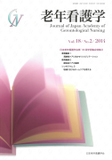Japanese
English
- 販売していません
- Abstract 文献概要
- 参考文献 Reference
抄録
本研究の目的は,意思疎通不可能な高齢者の終末期ケアに取り組む看護職の体験を明らかにすることである.看護職10人を対象に半構造的インタビューを実施し,質的記述的に分析した.その結果,『最期までその人らしく「生ききる」ことを支える』『自己のケアに価値を見いだしながらよりよい終末期ケアを目指す』『「生きる意味」をめぐる葛藤にとらわれ苦悩する』の3つの大カテゴリーが見いだされた.看護職は,高齢者が『最期までその人らしく「生ききる」ことを支える』ことをケアの基盤とし,いかなる状態であろうと,生命が存続する限り,ひとりの人として,その人らしく生を全うできるよう支援を行っていた.『自己のケアに価値を見いだしながらよりよい終末期ケアを目指す』看護職は,かかわりを通して得られる小さな喜びを糧に,前向きにケアに取り組んでいた.一方,『「生きる意味」をめぐる葛藤にとらわれ苦悩する』看護職は,自信を失っていく状況にあり,心理的負担を緩和するために,支援の必要性が示唆された.
The purpose of this study is to clarify experiences of nurses who provide terminal care for unresponsive elderly patients. Semi-structured interviews were conducted with 10 nurses for qualitative and descriptive analysis. As a result, three categories were determined, including: “to support people to ‘live’ as they choose until the end,” “to focus on terminal care while discovering values in the care they provide” and “to be distressed by conflicts surrounding the ‘meaning of life.” Nurses were providing support to help people to live as they choose as a human being, as long as their lives continue under any circumstances on the basis of care to “support the elderly to ‘live on’ as they choose to the last breath. Nurses “who aim at terminal care while discovering values in the care they provide" positively worked on care, thriving on small joy through involvement. On the other hand, nurses “who are distressed by conflicts surrounding the ‘meaning of life’ were in a situation of losing confidence, suggesting the need for support to alleviate psychological burdens.
Copyright © 2014, Japan Academy of Gerontological Nursing All rights reserved.


